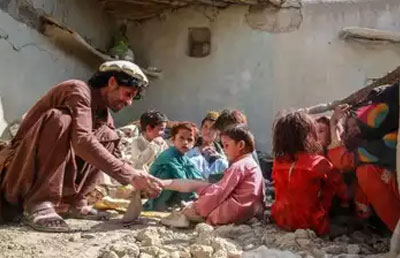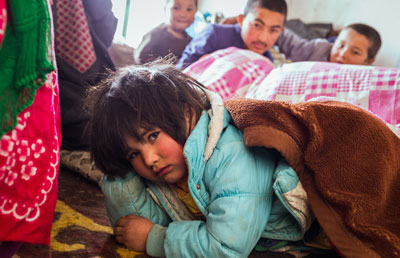KAFARAH
Kaffarah is the penalty which is imposed by the Shariah for the deliberate and flagrant nullification of the Saum of Ramadhan.
FIDYA DURING RAMADAN ENABLES THE EMPOWERMENT OF VULNERABLE COMMUNITIES

WE ARE PROVIDING SUSTAINABLE RELIEF THROUGH KAFFARAH DURING RAMADAN
During Ramadan, we offer sustainable relief through Kaffarah, aiding those in need with long-lasting support. Our initiative ensures stability and empowerment for vulnerable communities, fostering resilience and hope.

WE ARE EXTENDING KAFFARAH SUPPORT TO POOR FAMILIES IN NEED
We provide Kaffarah support to impoverished families, ensuring they receive necessary assistance during difficult times. Our efforts aim to alleviate their burdens and foster stability within their households.
Your Kaffarah Donation Can Make a Difference in Their Lives
What is Kaffarah
Kaffarah is the penalty which is imposed by the Shariah for the deliberate and flagrant nullification of the Saum of Ramadhan. A person who is unable to discharge the Kaffarah because of ill-health or very old age, will have to feed 60 poor persons two full meals for the day or the amount in cash which is given as Sadqah Fitr.
Kaffarah applies to only the Saum of Ramadhan.
Kaffarah comes into force only if the niyyat for fasting was made at night, i.e. before Subah Sadiq. Thus, if niyyat was made during the night to fast the following day, and then the fast is broken without valid reason, the Kaffarah penalty comes into effect.
Kaffarah for flagrantly breaking a fast of Ramadhan is to fast 60 consecutive days – sixty days, one after the other, without missing any day in between.
Since Kaffarah Saum belongs to the second class of the Wajib category of Saum (see page 3 ), it is essential to make niyyat for this type of fasting from the night, i.e. before Subah Sadiq. If the niyyat is not made before Subah Sadiq, the Kaffarah will not be valid.
The kaffarah will be rendered invalid if for any reason-be it a valid reason-even a single day is omitted during the 60 day Kaffarah course. Thus if a person fasted for 59 days and failed to fast on the sixtieth day due to illness, he will have to start the Kaffarah all over again. The only interruption which will not invalidate the kaffarah is haidh (the monthly menses of women).
A Kaffarah interrupted by the intervention of nifas will be rendered invalid.
A person who is unable to discharge the Kaffarah because of ill-health or very old age, will have to feed 60 poor persons. Each miskeen (poor) should be given two full meals for the day or the amount in cash which is given as Sadqah Fitr. This amount is the price of approximately 2 kilograms bread flour. Instead of cash, flour may also be given.
If the grain, food or cash of 60 persons is given to one man on a single day the Kaffarah will not be discharged. It will be regarded as an amount/quantity given to only one person. If the entire Kaffarah amount/quantity is distributed on a single day to only two persons, the Kaffarah will not be discharged thereby. Another 58 persons will have to be given each the Sadqah Fitr amount.
The Kaffarah option of feeding 60 Masakeen (poor persons) may be discharged on a single day by feeding 60 persons or giving the cash or grain to sixty persons.
The Kaffarah may also be spread over a period of 60 days. Daily, one miskeen may be fed or given the grain/cash until 60 days.
If after having paid the Kaffarah one recovers from the illness and is able to execute the 60 day fast, then fasting 60 days becomes obligatory. The money, etc. previously given to the poor will become a nafl charity.
If any miskeen among the sixty is a small child, the Kaffarah will not be discharged. If small children were fed, an equal number of adults will have to be fed in lieu. However, if the full Sadqah Fitr amount was given in cash to a poor child, the Kaffarah will be fulfilled.
Where the Kaffarah option of feeding or payment is valid, another person may pay it on the instruction of the one who is liable for the Kaffarah. Without such instruction it will not be valid.
Where the Kaffarah option of feeding or payment is valid, an Interruption during the course of feeding or paying will not invalidate the Kaffarah. Thus, if a person who is unable to fast the 60 days, undertakes to feed one miskeen for 60 days, but does not feed the miskeen for 60 consecutive days, the Kaffarah will be valid. As long as the miskeen is fed for 60 days, the Kaffarah will be valid even if the 60 days are spread over a long period.
A single Ramadhan makes Wajib only one Kaffarah irrespective of the number of fasts flagrantly broken during that Ramadhan.
If fasts were flagrantly nullified in more than one Ramadhan, the number of kaffarah will be equal to the number of Ramadhan. Thus, if fasts were flagrantly broken in three different Ramadhans, three different Kaffarah will be obligatory.
When the Kaffarah is commenced on the 1st day of the Islamic month, then fasting two full Islamic months will suffice for the Kaffarah even if the total number of days In the two months are 58 days (29 day months).
If, however, the Kaffarah is started during the course of the month, then it will be necessary to fast a full 60 days.




